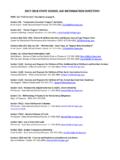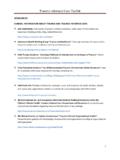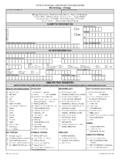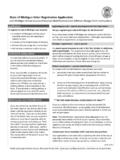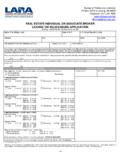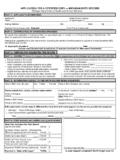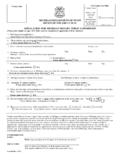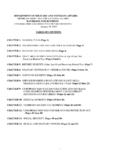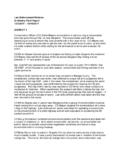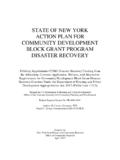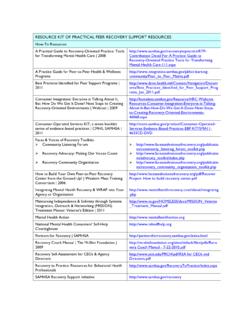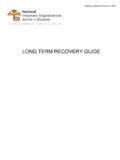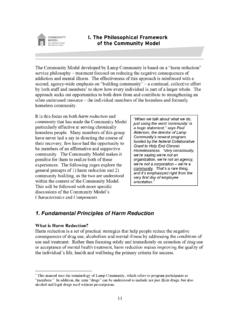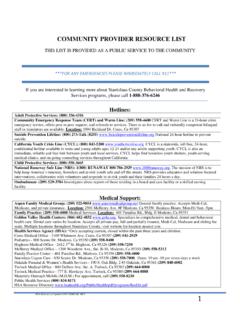Transcription of Michigan Department of Community Health, Behavioral …
1 Michigan Department of Community Health, Behavioral Health and Developmental Disabilities Administration BUREAU OF SUBSTANCE ABUSE AND ADDICTION SERVICES TREATMENT TECHNICAL ADVISORY #07 SUBJECT: Peer recovery Support Services ISSUED: March 17, 2008, revised July 16, 2012 EFFECTIVE: September 1, 2012 PURPOSE: The purpose of this technical advisory (TA) is to provide guidelines to the substance use disorder (SUD) field pertaining to the nature and structure of peer recovery support services and peer recovery support persons. The TA includes the type of position and perspective on potential kinds of responsibilities; and the identification of training and key elements to be within the training. This TA will provide information on the nature of peer recovery support services (PRSS) for the state of Michigan s publically funded SUD service system. It further establishes the differences between the two types of peers who would function within the SUD service system, and potentially within other collaborative partner organizations.
2 The TA presents information that will clarify the types of support services provided by trained peer recovery support personnel, as well as the level and nature of training needed to attain the skills and capacity to function effectively when providing PRSS. Additionally, this TA is intended to create a level of continuity within the state with regard to PRSS and the peers who provide these services. This TA should be viewed as an initial step in formalizing PRSS for the SUD service system. It should be expected that, as integration moves forward within the Behavioral health system, required training and education, the delivery of services, and even the titles of those providing services may change to be consistent with the needs of integration. SCOPE: This TA impacts coordinating agencies (CA) and the publically funded provider network. BACKGROUND: Peer recovery and recovery support services were added to the administrative rules for substance use disorders when the rules were revised in 2006.
3 This revision recognized peer recovery and recovery supports as an expansion of the existing licensing categories that cover treatment and prevention services in Michigan . The Michigan Department of Community Health, Bureau of Substance Abuse and Addiction Services (formerly the Office of Drug Control Policy) formed a workgroup in January 2007 for the purpose of developing standards and implementation guidelines for the new licensing category: Peer recovery / recovery Supports. BSAAS TREATMENT TECHNICAL ADVISORY #07 Effective: September 1, 2012 Page 2 of 12 This program category was intended to recognize and thereby permit the implementation of peer recovery support programs for persons with substance use disorders in Michigan . This licensing category was developed to allow programs to provide services to assist individuals in the process of recovery through program models such as using peers and other professionals in a Community setting and providing a location and other supports for activities of the recovery Community .
4 Peer recovery and recovery support services are designed to include prevention strategies and support services to attain and maintain recovery and prevent relapse. As a result of the recovery oriented system of care (ROSC) transformation in Michigan , as well as the evolution of peer support services and what they are perceived to be, BSAAS convened a second workgroup in late 2010 to review and amend the guidelines for Peer recovery / recovery Support Services. The content of this document was developed by the ROSC Transformation Steering Committee Peer-Based recovery Support Workgroup, a group of individuals who work to assist people with their recovery process by utilizing a broad array of SUD services and supports. These individuals work in various capacities and within the numerous factions found in a ROSC. Throughout the development process, the group utilized sources of information from some of the best known experts, individuals, and organizations operating within federal and state domains, who are engaged in the development and implementation of a ROSC, specifically with regard to the provision of PRSS.
5 Considerable thought, energy, and commitment contributed to this process, leading to the end goal of creating a sustainable tool to further the establishment by regulating and utilizing PRSS within a ROSC. Terms and Definitions The following terms and definitions are provided for understanding their application within the content of this document: Peer - A person in a journey of recovery who identifies with an individual based on a shared background and life experience. Peer recovery Associate - The name given to individuals who assist the peer recovery coach by engaging in designated peer support activities. These persons have been provided an orientation and brief training in the functional aspect of their role by the entity that will utilize them to provide supports. These individuals are not trained to the same degree as the peer recovery coach. Peer recovery Coach - The name given to peers who have been specifically trained to provide advanced peer recovery support services in Michigan .
6 A peer recovery coach works with individuals during their recovery journey by linking them to the Community and its resources. They serve as a personal guide or mentor, helping the individual overcome personal and environmental obstacles. BSAAS TREATMENT TECHNICAL ADVISORY #07 Effective: September 1, 2012 Page 3 of 12 recovery Community - Persons having a history of alcohol and drug problems who are in or seeking recovery , including those currently in treatment; as well as family members, significant others, and other supporters and allies (SAMHSA, 2009b). recovery Support Services - Non-clinical services that assist individuals and families to recover from alcohol or drug problems. They include social support, linkage to, and coordination among, allied service providers, and a full-range of human services that facilitate recovery and wellness contributing to an improved quality of life.
7 These services can be flexibly staged and may be provided prior to, during, and after treatment. RSS may be provided in conjunction with treatment, or as separate and distinct services, to individuals and families who desire and need them. Professionals, faith-based and Community -based groups, and other RSS providers are key components of ROSC (SAMHSA, 2009b). RECOMMENDATIONS: Peer recovery Support Services Core Values Within PRSS it is recognized that individuals in recovery , their families, and their Community allies are critical resources that can effectively extend, enhance, and improve formal treatment services. PRSS are designed to assist individuals in achieving personally identified goals for their recovery by selecting and focusing on specific services, resources, and supports. These services are available within most communities employing a peer-driven, strength-based, and wellness-oriented approach that is grounded in the culture(s) of recovery and utilizes existing Community resources.
8 PRSS emphasize strength, wellness, Community -based delivery, and the provision of services by peers rather than SUD service professionals. As such, these services can be viewed as promoting self-efficacy, Community connectedness, and quality of life, which are important factors to sustained recovery . This TA recognizes five core values developed by the Substance Abuse and Mental Health Services Administration (SAMHSA) Center for Substance Abuse Treatment (CSAT), and adds a sixth value: Keeping recovery first Placing recovery at the center of the effort, grounding peer services in the strengths and inherent resiliency of recovery rather than in the pathology of substance use disorders. Cultural diversity and inclusion Developing a recovery Community peer support services program that honors different routes to recovery and has leaders and members from many groups at all levels within the organization.
9 Participatory process Making sure the recovery Community directs, or is actively involved in, project design and implementation, so that recovery Community members can BSAAS TREATMENT TECHNICAL ADVISORY #07 Effective: September 1, 2012 Page 4 of 12 identify their own strengths and needs, and design and deliver peer services that address them. Authenticity of peers helping peers Drawing on the power of example, as well as the hope and motivation, that one person in recovery can offer to another; providing opportunities to give back to the Community , and embracing the notion that both people in a relationship based on mutuality can be helped and empowered in the process. Leadership development Building leadership abilities among members of the recovery Community so that they are able to guide and direct the service program and deliver support services to their peers.
10 (SAMHSA, 2009b) Supporting integrated mental health and SUD services Assuring that individuals with co-occurring substance use and mental health disorders receive integrated healthcare. Types of Peer recovery Support Services The CSAT recovery Community Support Program s PRSS Projects have developed and piloted a variety of peer services. These pilots have concluded that not all programs can provide all services, and that some peer leaders can provide one or more services. The placement of peers varies from recovery centers, stand-alone peer programs, traditional treatment and prevention programs, and other sites that may include: hospitals, correctional programs/institutions, mental health programs/facilities, doctors offices, veterans services, and counseling services (for profit and non-profit). The location where peers provide services can also vary from Community -based to office-based. Activities are targeted to individuals and families at all places along the path to recovery .
